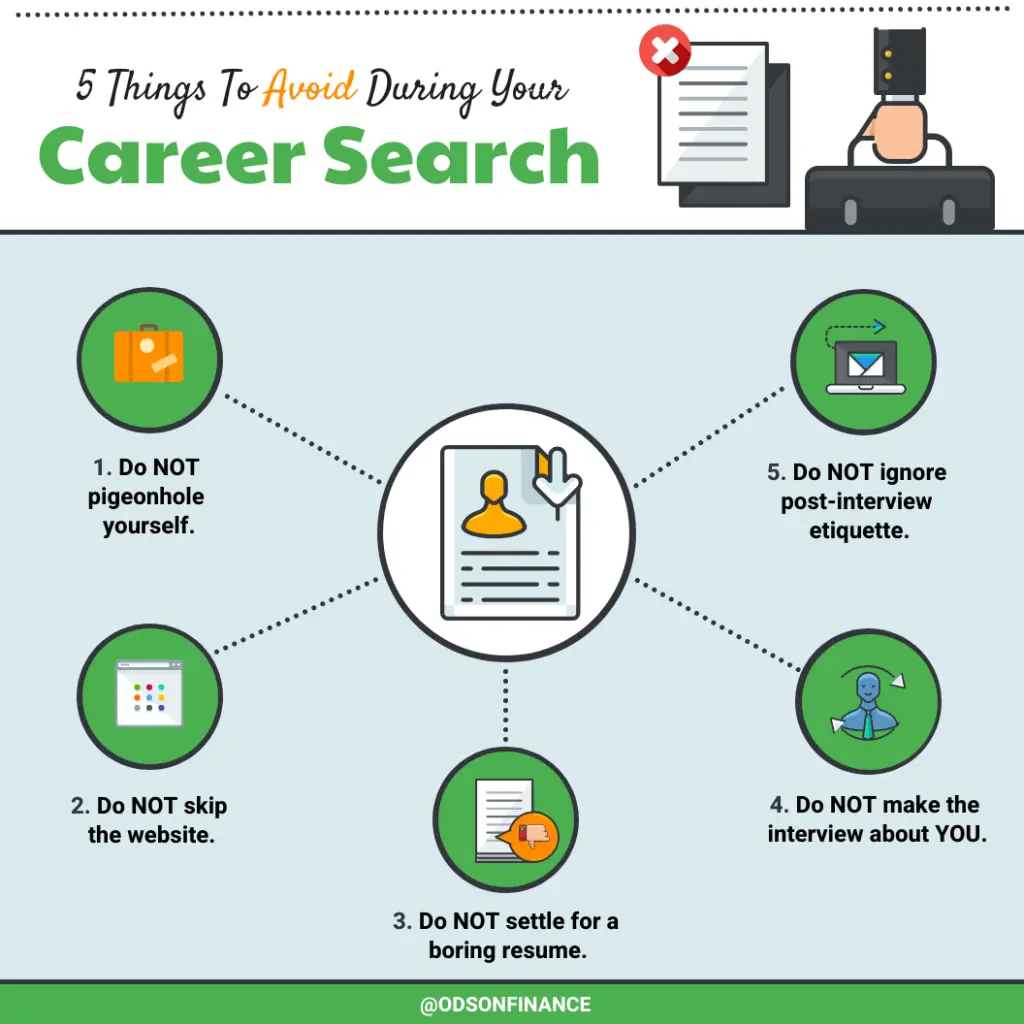5 Things to Avoid During Your Career Search

KEY POINTS:
-
(1) Do NOT pigeonhole yourself. Do open yourself up to career possibilities. Being open to different opportunities requires a balance between offering to perform eye care services that you may not be excited about, but would benefit a practice; and setting appropriate boundaries so that you don’t get sucked into practicing in a way that would make you unhappy.
-
(2) Do NOT skip the website. Do thoroughly research the opportunity for which you will be interviewing. You probably wouldn’t apply to a refractive surgery center if you have no interest in co-management or pre-op/post-op care.
-
(3) Do NOT settle for a boring resume. Do put in the creative effort to make your resume pop. Keep your resume to one page (if Elon Musk can have a one-page resume, so can you).
-
(4) Do NOT make the interview about YOU. Do express sincere interest in the needs/desires of the practice owner and their office. During an interview, practice owners would much rather know what you can do for them, not about what they can do for you.
-
(5) Do NOT ignore post-interview etiquette. Do follow-up with the employer a short while after the interview. Everyone likes to be appreciated. Thoughtful acts make people feel good. What better way to make an employer feel good about you than to follow-up with a thank you card or even a simple follow-up email.
We’re well into 2021, which means that we’ve moved past the dreaded year-that-shall-not-be-named and fourth year optometry students are nearing the finish line. The end of the school year means that most OD students have jobs lined up, are in the interview process, or are currently applying to jobs (at least they should be!). In the spirit of beginning the journey that is our optometric careers, the ODs on Finance team and I have come up with a brief article that highlights a few “DO NOTs” of the job search and how to address them.
(1) Do NOT pigeonhole yourself
Do open yourself up to career possibilities. For example, it would be unrealistic to think that you will graduate from optometry school and make $200k/year only fitting scleral lenses while seeing eight patients per day, three days a week as an associate OD. However, it may be feasible to start a specialty contact lens center within an existing practice that has the patient demand for it. It would also be possible to implement a dry eye practice within an office if you are passionate about ocular surface disease. There are a number of optometric “subspecialties” that new grads have the skill sets to provide.
Being open to different opportunities requires a balance between offering to perform eye care services that you may not be excited about, but would benefit a practice; and setting appropriate boundaries so that you don’t get sucked into practicing in a way that would make you unhappy. For example, I gladly offer to see kids in my practice, but if I only performed peds exams every day of the week I would be miserable (shout out to all the rock star peds ODs!).
Read this to learn more about getting the most out of your career search: Crushing Your Job Search Post-COVID-19
(2) Do NOT skip the website
Do thoroughly research the opportunity for which you will be interviewing. This may sound really obvious, however you would be amazed at how many OD students skip this step. It would be pretty silly to interview for a nursing home opportunity when you have no interest in ocular disease and would rather focus on refractive eye care. Alongside this, you probably wouldn’t apply to a refractive surgery center if you have no interest in co-management or pre-op/post-op care.
Save yourself and the employer some time and do your homework before agreeing to an interview.
(3) Do NOT settle for a boring resume
Do put in the creative effort to make your resume pop. Keep your resume to one page (if Elon Musk can have a one-page resume, so can you). Resumes tend to be a work in progress, meaning you will constantly update and edit certain items to better match certain positions or simply adjust the content as you progress through your career. Provide information pertinent to the position(s) that you may be applying for, make sure the contact information is up-to-date and don’t be afraid to add a bit of color to spruce it up.
For a more detailed review, click here to read "How to Create the Perfect OD Resume".
(4) Do NOT make the interview about YOU
Do express sincere interest in the needs/desires of the practice owner and their office. For example, perhaps the senior doctor-owner wants to dial back on her patient care days to focus more on growing her practice. However, she would need a sharp OD to care for her elderly patients that require ocular disease management. Would you be able and willing to fill that role? Maybe an owner would like to expand services at her pediatric practice but is not knowledgeable about myopia control. Could you spearhead a myopia control campaign and start prescribing atropine while fitting orthokeratology and multifocal contact lenses?
During an interview, practice owners would much rather know what you can do for them, not about what they can do for you.
For more tips on crushing your job interview, check out this to read "How to Land the Perfect OD Career & Job Interview"
(5) Do NOT ignore post-interview etiquette
Do follow-up with the employer a short while after the interview. For goodness sakes, put into practice the manners that your parents taught you as a kid. Everyone likes to be appreciated. Thoughtful acts make people feel good. What better way to make an employer feel good about you than to follow-up with a thank you card? Heck, even a thank you email shows diligence and consideration. Writing thank you cards is becoming a lost art, which gives you an even better reason to consider doing it - because no one else is! You may find it to be weird or uncomfortable at first, but it gets easier with time.
Impressions matter. Let’s take the worst case scenario and pretend that an employer hired a different OD candidate. That employer will still remember you more favorably for following up than the other job applicants. Furthermore, maybe she can recommend a different owner who is looking to hire. We’re not always aware of other doors that may open. It’s never wrong to show gratitude and appreciation after an interview.
Take these tips and apply them to stand out as a premier job candidate and land the career opportunity of your dreams!
Want to learn how to Dominate your Career Search? Check out How to Find the Right Optometric Career Path
Want to get $1000 Bonus and the lowest Refi Rate on your Student Loan? Check out Recommended Refi Student Loan Lenders


Facebook Comments